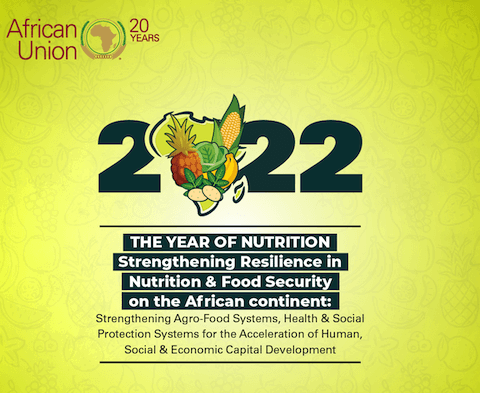|
Getting your Trinity Audio player ready...
|
By Baboloki Semele
The African Union Development Agency (AUDA-NEPAD) in partnership with Southern Africa Youth Forum (SAYoF) seeks to hold a two-day youth and media awareness and orientation symposium on the AU year of nutrition. The two-day orientation billed for 9th and 10th August in Accra, Ghana will be held under the theme “Strengthening Resilience in Nutrition and Food Security on the African Continent.”
According to a concept note availed to this publication by AUDA-NEPAD, the conference will bring together 20 youth, young parliamentarians, and the media.
The concept note further indicates that the role of youth and the media in championing nutrition will be clearly articulated during the conference, and a clear Call for Action to inform the young people, the media, the governments, and other stakeholders will be established.
The conference will be held in a hybrid format to allow the participation of other young people and stakeholders online. The objectives of the Youth and Media Awareness and Orientation Session on the African Union Year of Nutrition include raising awareness and orientation on the AU Year of Nutrition and visibility for AUDA-NEPAD’s role in Nutrition, to engage Africa’s youth and the media towards sustainable action on nutrition towards building the Africa we want, to unpack the Year of Nutrition and develop media tools on a Call to Action on Nutrition investments and commitments as well as to introduce Agenda 2063 and Malabo Declaration Media Network on Nutrition targets and goals.
On the other hand, the expected results and deliverables include a call to Action for investments in Nutrition and related social media tools, an actionable social media campaign with the Youth and the Agenda 2063 Media Network on the Year of Nutrition Greater visibility for AUDA-NEPAD through media interviews from different regions of the Continent, increased awareness and role of AUDA-NEPAD through the Africa Youth Consortium and SADC Youth News – Special Edition Newsletter as well as conference Report as an advocacy tool for similar initiatives.
Quick facts on the AU year of nutrition
Research indicates that Africa is not on track to meet the Sustainable Development Goal (SDG) 2 targets to end hunger and ensure access by all people to safe, nutritious, and sufficient food all year round, and end all forms of malnutrition. The most recent estimates show that 281.6 million people on the continent, over one-fifth of the population, faced hunger in 2020, which is 46.3 million more than in 2019.
This deterioration continues a trend that started in 2014, after a prolonged period of improving food security. In addition to hunger, millions of Africans suffer from widespread micronutrient deficiencies, while overweight and obesity are already significant public health concerns in many countries. Progress towards achieving the global nutrition targets by 2030 remains unacceptably slow.
However all hope is lost as the Assembly of Heads of State and Government of the African Union declared 2022 as a year of Nutrition bordered on the theme, “Strengthening Resilience in Nutrition and Food Security on the African Continent: Strengthening Agro-Food Systems, Health, and Social Protection Systems for the Acceleration of Human, Social and Economic Capital Development.”
It is apparent that the burden of malnutrition in Africa needs a holistic approach or sustainable solutions as the
The COVID-19 pandemic has worsened it. Africa is endowed with natural and human resources coupled with vast nutritional foods such as barley plants in East and Southern Africa, cassava, green bananas and plantains in West Africa, and Okra, kale, and various green nutritious vegetables throughout the continent. However, the Cost of Hunger Africa Study noted that African countries are losing between 1.9 and 16.5 percent of their Gross Domestic Product (GDP) due to child under-nutrition.
According to the findings of the Continental Accountability Scorecard launched by the African Union and the Africa Leaders for Nutrition (ALN) in 2019, data shows that 8 million children under five years are stunted, and 58.7 million of these are in Africa.
Only seven Member States have stunting rates below 19 percent, fifteen Member States have child wasting prevalence below five percent, and thirty-eight countries have women’s anemia prevalence rates of more than 30 percent, Eighteen Member States have at least 50 percent of infants exclusively breastfed, and twenty Member States have more than 70 percent prevalence rates for vitamin A supplementation.
Africa’s largest population is youth and women, which presents a potential demographic dividend that, if harnessed, can catalyze effective development through sustainable agriculture that promotes a healthy continent and sustainable food security. Food and nutrition security in Africa is off track.
In 2020, more than one in five people in Africa faced hunger—more than double the proportion of hungry people in any other region. In fact, the continent remains a net food importer at an annual cost of $43 billion.
It is anticipated that the two-day workshop will produce tangible results to return Africa back to track towards the survival of the Africans.






